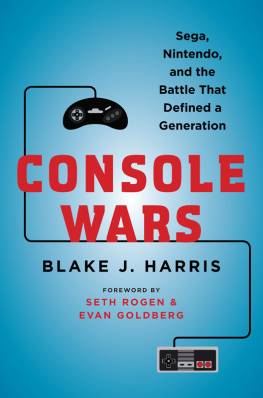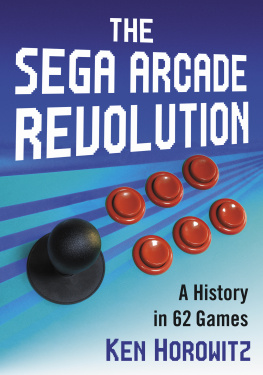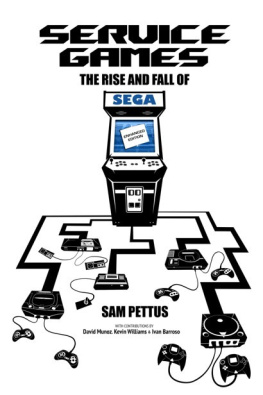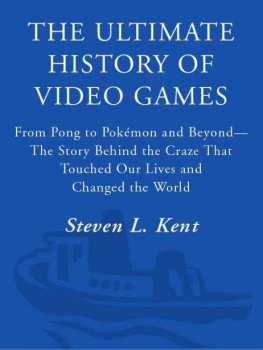T his book would not exist (nor likely would my writing career) without Julian Rosenberg, my mind-bogglingly wonderful lit manager. Im still not sure how to properly thank you, but I thought that a good start would be to give you the one thing that those in Los Angeles covet above all else: top billing.
And while the globe is spun to Los Angeles, Id like to extend a giant thanks to the fine gentlemen at Point Grey PicturesSeth Rogen, Evan Goldberg, and James Weaverfor believing in this book from the very beginning. In the Nintendo of my life, you three are my power glove. I am also forever indebted to Scott Rudin, whose talent for telling stories is second to none, and whose early confidence in my work is one of the greatest compliments Ive ever received. Without you and the ever-brilliant Eli Bush, this book never would have reached the next level.
Thank you to my incredible attorney, Lev Ginsburg, and my fantastic agents: Jon Cassir and Dan Rabinow at CAA, and Alex Glass at Trident Media.
Thank you to my amazing editor, Mark Chait, and everyone at HarperCollins for your patience, positivity, and overall perfection.
Thank you to everyone who worked on the documentary based on this book, especially Jonah Tulis (my co-director), Matt Hamachek (our editor), and Seamus Tierney (our cinematographer).
Thank you to my pals who generously read half-finished thoughts and mangled chapters along the way: Josh Benedek, Frank Ceruzzi, Grant DeSimone, Andrew Hirsch, Dan Kim, Josh Kleinman, Dave McGrath, Brian Nathanson, and Jeremy Redleaf.
Thank you to my parents, Robin and Richard, for pretty much being the greatest people in the world (and for supporting my literary desires even after that racially charged novel I wrote in fourth grade).
Thank you to my brother, Dylan, for being the kindest person I know, and forgiving me for how I acted during our childhood (like a dick).
Thank you to Aunt Loren, Uncle Christopher, Jackson and Hunter; Aunt Erica, Uncle Bradley, Tyler and Amelie; and, of course, Grandma, for all those amazing connections over the years.
Thank you to Katie for being my daily inspiration. How you put up with me during the writing of this book, Ill never know, but please never stop.
And second-to-last but not least, thank you to my incredible research assistants: Claude Bear, Kiki Bear, Baby Bart, Freggly, Tater Tot, Boots, and the one and only Pipstick. Without you rascals, life would be un bear able.
Finally, the biggest thanks of all must go to the people who populate the pages of this book. During the writing of this book, I interviewed more than two hundred former employees of Sega and Nintendo, as well as dozens of other individuals with various vantage points into the videogame industry from this era. Although I am grateful to every single person who shared with me their time and insights, there are a few individuals whom Id like to mention by name whose above-and-beyond effort really shaped the scope of the narrative.
First and foremost Id like to thank Tom Kalinske, who gave me the time of day back when I was just a kid with an idea. Actually, he gave me much more than simply the time of day, because thats just the kind of guy he is. Over the course of our three-year relationship, he has never been anything less than the kind, clever, and cool guy described within the pages of this book.
In addition to Tom, I am particularly indebted to the following individuals: Sam Borofsky, Don Coyner, Cindy Gordon, Mike Fischer, Diane Fornasier, Jeff Goodby, Tony Harman, Karen Kalinske, Howard Lincoln, Brenda Lynch, Peter Main, Sean McGowan, Al Nilsen, Al Nilsen #2 (because he must have been a clone to be as omnipresently helpful as hes been), Olaf Olafsson, Randy Peretzman, Howard Phillips, Arthur Pober, Larry Probst, Steve Race, Paul Rioux, John Sakaley, Gail Tilden, Shinobu Toyoda, Ellen Beth Van Buskirk, and Bill White.
Thank you all for letting me tell your story; it has been the greatest honor of my life.
C onsole Wars is a narrative account based on information obtained from hundreds of interviews. Re-creating a story of this nature, which draws from the recollections of a multitude of sources, can often lead to inconsistencies; particularly when dealing with industry competitors and especially when dealing with events that took place more than two decades ago. As such, I have re-created the scenes in this book using the information uncovered from my interviews, facts gathered from supporting documents, and my best judgment as to what version most closely fits the documentary record.
In certain situations, details of settings and description have been altered, reconstructed, or imagined. Additionally, most of the dialogue in this book has been re-created based on source recollections of content, premise, and tone. Some of the conversations recounted in this book took place over extended periods of time or in multiple locations, but have been condensed, or reorganized in a slightly different manner, while remaining true to the integrity and spirit of all original discussions.
T om Kalinske had a secret.
For years he had managed to keep it to himself, covering it up with a combination of white lies, noncommittal nods, and uneven smiles, but as he lay on a magnificent beach in sunny Maui with his loving wife and three energetic daughters, he could no longer keep it inside. He had to tell someone.
The right person to tell was Karen, of course. She had always been there for him, and most important, she seemed to possess a magical ability for making his anxieties disappear. She really was his voice of reason, the love of his life, and apparently very much asleep. Hey, Karen, he said, nudging her now-tanned shoulder. Karen? He lifted up her sunglasses, which confirmed that the blazing sun had knocked her into a slumber. Kalinske considered some other subtle means to poke or prod his wife into waking up until, upon further inspection, he noticed that their newborn daughter, Kelly, cradled in her arms, was also asleep. Sorry about that, ladies, Kalinske said, honoring the unwritten rule that all fathers should abide by: do not, under any circumstances, wake an infant, especially when her fragile little nap allows Mom a rare moment of uninterrupted sun-filled dreams. Karen, it appeared, was off the hook, and wouldnt have to play the role of secret-keeper this time.
Kalinske thought about telling one of his other daughters, Ashley (five years old) or Nicole (three), but they were ankle deep in the ocean capturing hermit crabs in a bright yellow bucket and making the kinds of memories that theyd inevitably forget and only their father would remember. So he returned to reading a day-old New York Times , but as he scrolled through previews of baseball games that had already been played, a slender silhouette covered his newspaper. Hello, Tom, a cheerful voice said. You are a difficult man to track down.
Kalinske looked up to find a Japanese man with piercing brown eyes and a messy, wind-mangled combover: Hayao Nakayama. What are you up to? Nakayama asked, trying to emit a friendly smile, which came out looking more like an ominous smirk. Kalinske would soon learn that Nakayama was incapable of producing a genuine smile. His round face always held too much mystery, making simple, genuine emotions too hard to pull off.
Well, I was trying to have a nice, relaxing moment with the sun here, until you got between us, Kalinske gracefully shot back. He never allowed himself to appear off guard in conversations and was committed to masking any discomfort or unease with a Jamesdeanian coolness. Nakayama suddenly realized that he was casting a shadow over Kalinske and took a couple of steps to the side. As the sun hit his face, Kalinske smiled and greeted his unexpected guest. Great to see you, Nakayama-san. What brings you out to Hawaii?
Next page







